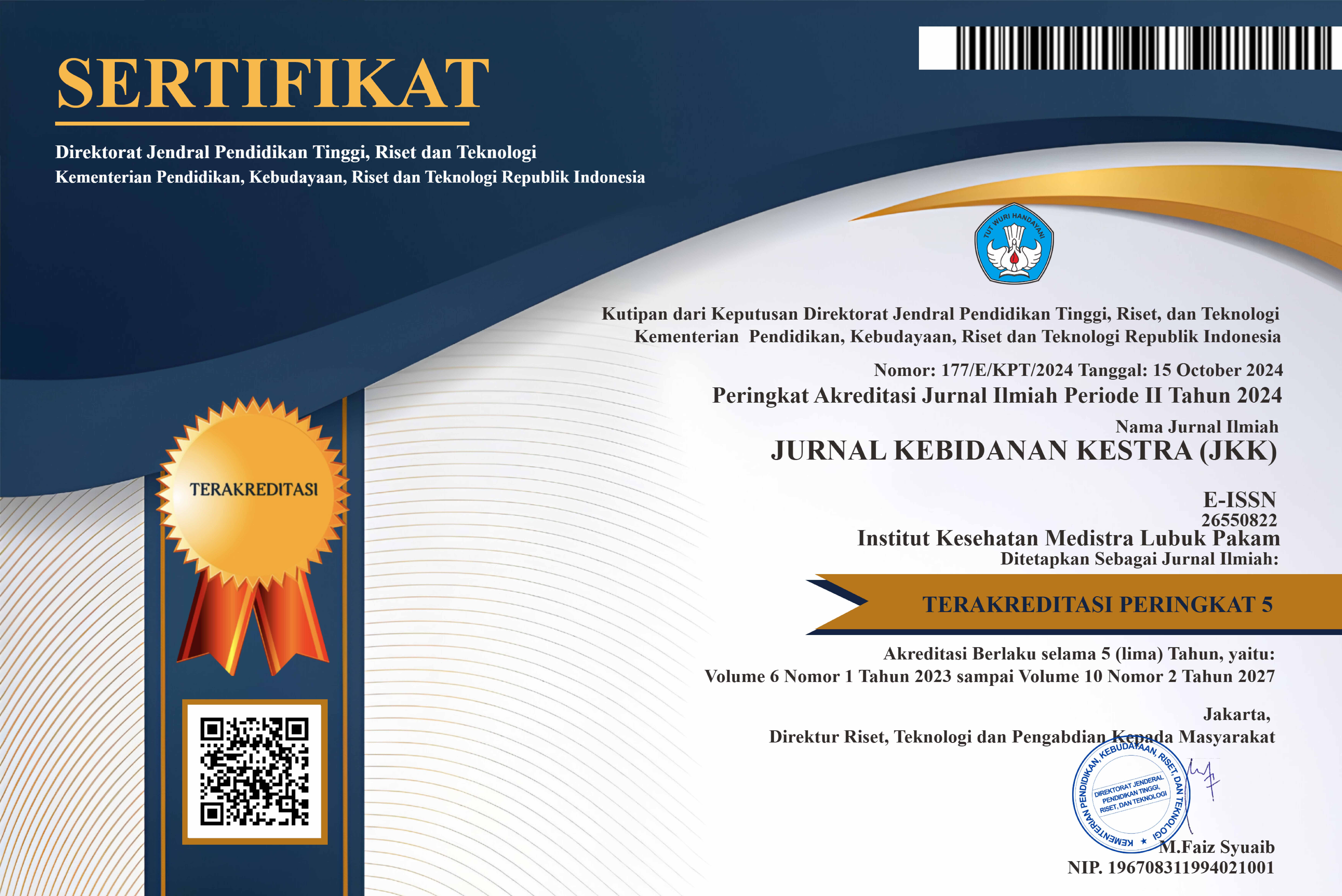The Correlation Between Mother's Knowledge And Husband's Support On Contraception Use In sri Tawang Sapto Hastuti, Amd.keb Maternal Clinic of Surabaya
DOI:
https://doi.org/10.35451/jkk.v5i2.1444Keywords:
Knowledge, Husband Support, ContraceptiveAbstract
Based on Surabaya BKKBN data for 2020, short-term contraception users reached 58.6%, but long-term contraception users were only around 23.3%. The use of long-term contraception must be increased in an effort to reduce rates of infertility, abortion, pregnancy protection, and death. To become an acceptor of long-term contraception, a woman must have good knowledge and have the support of their husbands. This study aims to determine the relationship between mother's knowledge and husband's support with contraceptive use. This type of research is quantitative research with a correlational design with a cross sectional approach. The study population was couples of childbearing age at PMB Sri Tawang SH at A.Md.Keb Surabaya. The sampling technique used probability sampling, obtained a sample of 60 respondents. The research instrument used a questionnaire. Data analysis used the chi-square statistical test. The results of this study indicate that there is a relationship between maternal knowledge and contraceptive use (p-value 0.000 and closeness value 0.397), and there is a relationship between husband's support and contraceptive use (p-value 0.000 and closeness value 1.000). The conclusion of this study is that there is a relationship between mother's knowledge and husband's support with contraceptive use. It is recommended that couples of childbearing age can increase their knowledge about various type of contraceptive methods according to their needs.
Downloads
References
Arbaiyah, I. (2021). Hubungan Pengetahuan dan Dukungan Suami dengan Penggunaan Kontrsepsi IUD di Desa Balakka Tahun 2020. Jurnal Kesehatan Ilmiah Indonesia (Indonesian Health Scientific Journal), 6(2), 86–94.
BKKBN. (2015). Keluarga Berencana dan Kontrasepsi (Cetakan ke- 5). Jakarta: Pustaka Sinar Harapan.
Choiriyah, L., Armini, N. K. A., & Hadisuyatmana, S. (2020). Dukungan Suami dalam Pemilihan Metode Kontrasepsi Jangka Panjang (MKJP) pada Pasangan Usia Subur (PUS). Indonesian Journal of Community Health Nursing, 5(2), 72–79.
Depkes RI. (2016). Keluarga Berencana. Jakarta: Depkes RI.
Kemenkes RI. (2018). Data dan Informasi Profil Kesehatan Indonesia. Jakarta: Kementerian Kesehatan Republik Indonesia.
Notoatmodjo, S. (2018). Metodologi Penelitian Kesehatan (Ketiga). Jakarta: Rineka Cipta.
Nurlisis, & Anggraini, W. (2016). Hubungan Pengetahuan Ibu dan Dukungan Suami dengan Pemakaian Kontrasepsi Jangka Panjang di Wilayah Kerja Puskesmas Rumbai Pesisir. Photon: Jurnal Sain Dan Kesehatan, 6(02), 75–80.
Safitri, S. (2021). Pengetahuan Ibu dan Dukungan Suami berhubungan dengan Pemakaian Metode Kontrasepsi Jangka Panjang (MKJP). Jurnal Akademika Baiturrahim Jambi, 10(1), 47–54.
Sidabukke, I., & Siahaan, J. M. (2021). Hubungan Pengetahuan dan Kualitas Pelayanan KB dengan Pemilihan Metode Kontrasepsi Jangka Panjang (MKJP) di Klinik Kesuma Bangsa Kecamatan Perbaungan Tahun 2020. Jurnal Teknologi Kesehatan Dan Ilmu Sosial (Tekesnos), 3(1), 278–285.
Subekti. (2011). Hubungan Tingkat Pengetahuan Akseptor KB tentang Alat Kontrasepsi dalam Rahim (AKDR) dengan Dukungan Suami dalam Pemilihan Alat Kontrasepsi AKDR di Desa Puguh Kecamatan Pegadon Kabupaten Kendal. Jurnal Ilmiah Kesehatan Akbid Uniska Kendal.
Wahyuni, W., Ismawati, I., Wijayanti, W., Wahyuni, T. S., Gultom, L., Wulandari, D. T., Hutabarat, J., Argaheni, N. B., Permatasari, D., & Fauziah, N. A. (2022). Penyakit Akibat Kegawatdaruratan Obstetri. Medan: Kita Menulis.
Widyarni, A., & Dhewi, S. (2018). Hubungan Pengetahuan dan Sikap Ibu terhadap Penggunaankb Metode Kontrasepsi Jangka Panjang (MKJP) di Wilayah Kerja Puskesmas Paramasan Kabupaten Banjar, Martapura. Journal of Midwifery and Reproduction, 2(1), 1–7.
Downloads
Published
Issue
Section
License
Copyright in each article is the property of the Author.



























